|

Compiled by Afheeba Alikhan
Badi-ud-Din Mahamud Girls’ College, Kandy.
Glo-Sheets
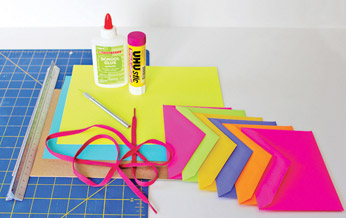 Where do inventive ideas come from? Sometimes they come out of the
dark. That happened with Becky Schroeder's Glo-Sheets. Becky was
ten-years-old when she began experimenting with phosphorescent (Shining
with a phosphoric light; luminous without sensible heat) materials,
which give off light but not heat. Then she covered an acrylic board
with phosphorescent paint. Where do inventive ideas come from? Sometimes they come out of the
dark. That happened with Becky Schroeder's Glo-Sheets. Becky was
ten-years-old when she began experimenting with phosphorescent (Shining
with a phosphoric light; luminous without sensible heat) materials,
which give off light but not heat. Then she covered an acrylic board
with phosphorescent paint.
Acrylic is an especially tough plastic. After Becky exposed the board
to light, the paint glowed through one or two sheets of paper in the
dark.
Becky patented her invention when she was only 12. Luckily, her
father was a patent lawyer. Altogether, she got 12 patents for Glo-Sheets
and improvements on them.
By 1983, Becky was 22 and had set-up a company to market her Glo-Sheets.
Doctors have used Glo-Sheets to read medical charts or take notes in dim
hospital rooms without disturbing their patients.
Becky has also sold Glo-Sheets to police departments and the United
States Navy.
Popsicle
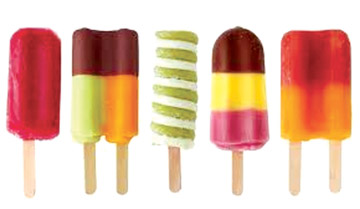 In 1905, the popsicle was invented by an 11-year-old Frank Epperson.
Frank Epperson was only 11-years-old when he invented the originally
named Epsicle. He had left his fruit flavoured Soda outside on the porch
with a stir stick in it. The drink froze to the stick and tasted good.
It took 18 more years in 1923 for Epperson to apply for a patent for a
“frozen ice on a stick” called the Epsicle ice pop, which his children
re-named popsicle. In 1905, the popsicle was invented by an 11-year-old Frank Epperson.
Frank Epperson was only 11-years-old when he invented the originally
named Epsicle. He had left his fruit flavoured Soda outside on the porch
with a stir stick in it. The drink froze to the stick and tasted good.
It took 18 more years in 1923 for Epperson to apply for a patent for a
“frozen ice on a stick” called the Epsicle ice pop, which his children
re-named popsicle.
In 1925, Frank Epperson sold his famous popsicle to the Joe Lowe
Company of New York. Good Humour now owns the rights to the popsicle.
Popsicle sticks were first made from Birch wood.
Earmuffs
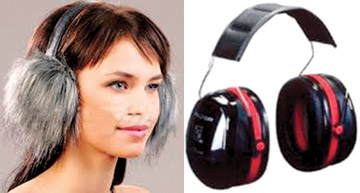 Chester Greenwood invented the earmuff, among other things, and
almost anyone in town can tell you how it happened; he loved to skate as
a young teen, 1873, but his ears got cold. He wrapped his woolen scarf
around his head, but that was too itchy and uncomfortable, so he got his
grandmother to sew circles of beaver pelt on a metal frame he had
fashioned and (as a French-challenged college student of mine once
wrote): wallah! Chester Greenwood invented the earmuff, among other things, and
almost anyone in town can tell you how it happened; he loved to skate as
a young teen, 1873, but his ears got cold. He wrapped his woolen scarf
around his head, but that was too itchy and uncomfortable, so he got his
grandmother to sew circles of beaver pelt on a metal frame he had
fashioned and (as a French-challenged college student of mine once
wrote): wallah!
He patented the invention as “ear-mufflers” on March 13, 1877, and
went into business, building a factory that produced 400,000 sets of
earmuffs a year at its peak. He made his fortune during World War I
supplying the U.S. Army, and the factory continued production for 60
years, till Chester’s death in 1937.
Water skiing
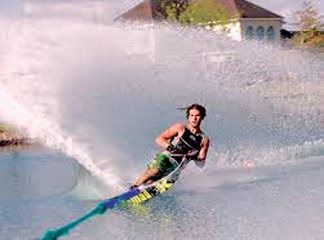 Water skiing came about on June 28, 1922 when 18-year-old Ralph
Samuelson of Minnesota, proposed the idea that if you could ski on snow,
then you could ski on water. Water skiing came about on June 28, 1922 when 18-year-old Ralph
Samuelson of Minnesota, proposed the idea that if you could ski on snow,
then you could ski on water.
Ralph first attempted water skiing on Lake Pepin in Lake City,
Minnesota, towed by his brother Ben. The brothers experimented for
several days until July 2, 1922 when Ralph discovered that leaning
backwards with ski tips up lead to successful water skiing.
Snowboards
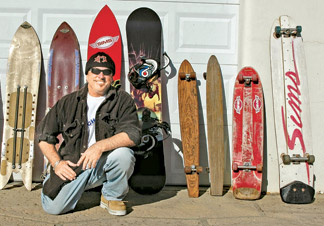 Tom Sims, who was credited with inventing one of the earliest
snowboards and as a world-champion competitor and manufacturer, with
helping to further snowboarding’s widespread acceptance in the sporting
world, died on September 12 in Santa Barbara, Calif. He was 61. Tom
Sims, an avid skateboarder, built a “ski board” in his seventh-grade
wood shop class to ride in the winter. Tom Sims, who was credited with inventing one of the earliest
snowboards and as a world-champion competitor and manufacturer, with
helping to further snowboarding’s widespread acceptance in the sporting
world, died on September 12 in Santa Barbara, Calif. He was 61. Tom
Sims, an avid skateboarder, built a “ski board” in his seventh-grade
wood shop class to ride in the winter.
“That’s what led me to build the first snowboard: not being able to
skateboard on an icy street,”. “So after that, it was just 12 months a
year of boarding, whether it be skateboarding, snowboarding or surfing,
he told a newspaper magazine.
His boyhood invention did not work very well, but it inspired him to
continue to refine the design. At the same time, he began building a
career as a designer of skateboards. In the mid-1970s, when Sims was
riding boards he had made in professional competitions, he founded Sims
Skateboards in Whittier, Calif., to manufacture and market them. |


